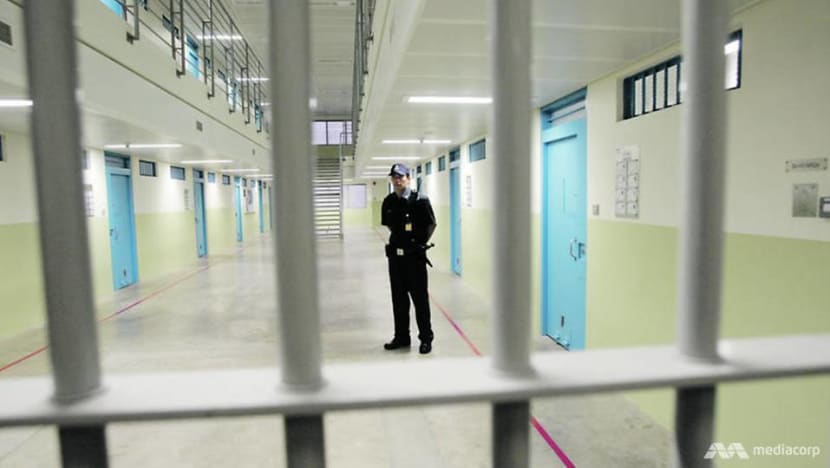Dangerous sex offenders who remain a threat to public could stay in jail despite finishing sentence: Shanmugam

File photo of Changi Prison. (File photo: TODAY)
SINGAPORE: Dangerous sex offenders could stay in jail after serving their sentence if they remain a threat to the public, said Law and Home Affairs Minister K Shanmugam in Parliament on Tuesday (Apr 5), adding that "there will be no automatic release" for these offenders.
He was responding to a question from MP Joan Pereira (PAP-Tanjong Pagar), who had asked about safeguards to protect members of the public, particularly children and women, from recalcitrant sex offenders.
"I have asked the Ministry of Home Affairs (MHA) and Ministry of Law (MinLaw) to study a new sentencing option, quite a novel approach, to give more protection to the public from dangerous first-time offenders as well as repeat offenders who commit very serious hurt and sexual offences," Mr Shanmugam said.
"The proposal is not quite fleshed out yet ... The outline is that offenders will have to serve the minimum jail sentence, which could be anywhere between five to 20 years. But when the jail sentences end, when they have completed it, there will be no automatic release.
"At the point of release, they have to be assessed as to whether they pose a threat to the public. If they are assessed to continue to pose a threat, they will continue to be detained."
The proposal comes after MHA and MinLaw had earlier conducted a public consultation on introducing an Enhanced Detention for Public Protection regime to improve its legislative levers in dealing with serious violent or sexual offenders.
The ministries pointed to cases over the years where offenders have again committed serious violent or sexual offences after being released from jail for similar offences, raising the question of whether more should be done to protect the public from such dangerous offenders.
Following the feedback gathered, the Enhanced Detention for Public Protection regime will be renamed the Sentence for Enhanced Public Protection.
"We sought public feedback on these proposals in July of last year. We are considering our approach. Obviously, we will come back to the House, because any such approach is going to require changes to the law," Mr Shanmugam said.
The minister said this would represent a "major change" in the way Singapore's sentencing regime works, highlighting that today, a court imposes a sentence and when it ends, the person is released.
"The United Kingdom tried this approach, I have to say, with very mixed results, but I think we can make it work. And the rationale is very simple: Person commits an offence, it is a serious, heinous offence – say, raping a young child, or rape followed by murder," he said.
"The judge can express outrage, she can impose a very stiff sentence, assuming it is not capital punishment. But the judge will not know whether in X number of years, the person will no longer remain a danger to society. And there have been enough cases around the world, where the day after the person is released, literally, he goes out and commits another serious offence."
Mr Shanmugam said Singapore has had one or two of such cases, and that whether they remain a threat to the public can only be assessed at the point of release.
As for whether the authorities will consider lifelong counselling and monitoring of these offenders, Mr Shanmugam said psychologists from the Singapore Prison Service (SPS) already give sex offenders psychological assistance.
Those who have committed serious sexual offences can also be put on the Mandatory Aftercare Scheme, which provides community support, counselling and case management with supervision for up to two years. SPS also works closely with the families of ex-offenders and community partners to support them after their release.
"We will refer the Member’s suggestion, to consider lifelong counselling and monitoring for recalcitrant sex offenders, to the relevant agencies, for them to consider," Mr Shanmugam said.
PREVENTING CONVICTED PAEDOPHILES FROM WORKING WITH CHILDREN
Ms Pereira then asked about precautions to prevent ex-offenders from working with children, in scenarios where they are convicted paedophiles.
Mr Shanmugam replied that the safeguards are in the licensed vocations and regulated institutions, having earlier pointed out that the Ministry of Education (MOE) and Ministry of Social and Family Development work closely with the police to screen those who apply for jobs when they have to work with children, in licensed pre-schools and schools.
"But those who work in enrichment centres or other commercial service providers for children do not need to be screened in today’s framework," he said.
"Even then, even in licensed premises, the question is whether all employees need to be screened, for example cleaners and so on. We know that MOE does a screening for all, including cleaners, but others may not."
Mr Shanmugam said he has asked MHA to look at the screening framework and see how the process can be strengthened, although he cautioned the need for a "balance between making sure that people have a second chance, but at the same time protecting the vulnerable".
"Some, not so easy issues to consider. For example, what about freelance providers of services, (such as) piano teachers, or swimming coaches? The regulatory framework for that is not so easy to consider, but we will look at it, and we will come back before the House," he added.
















